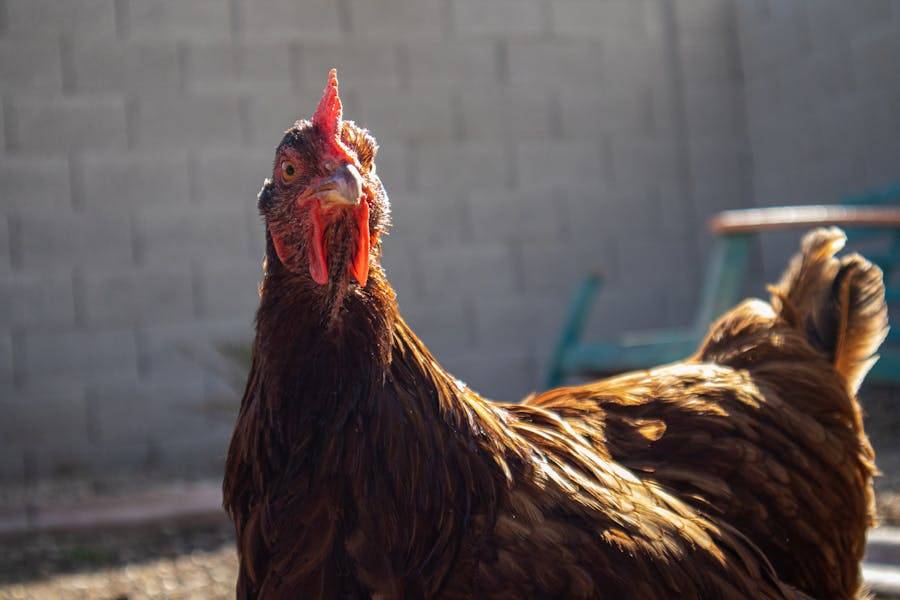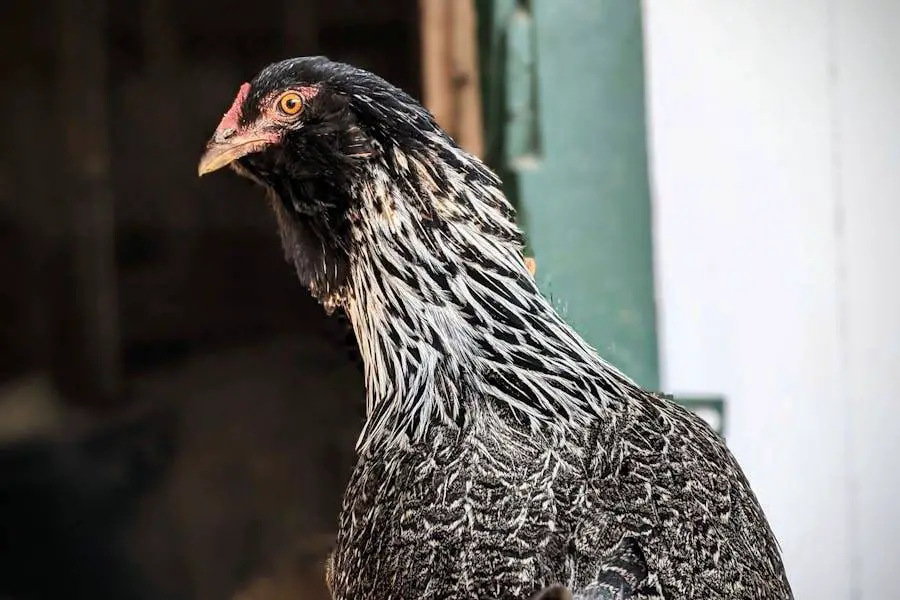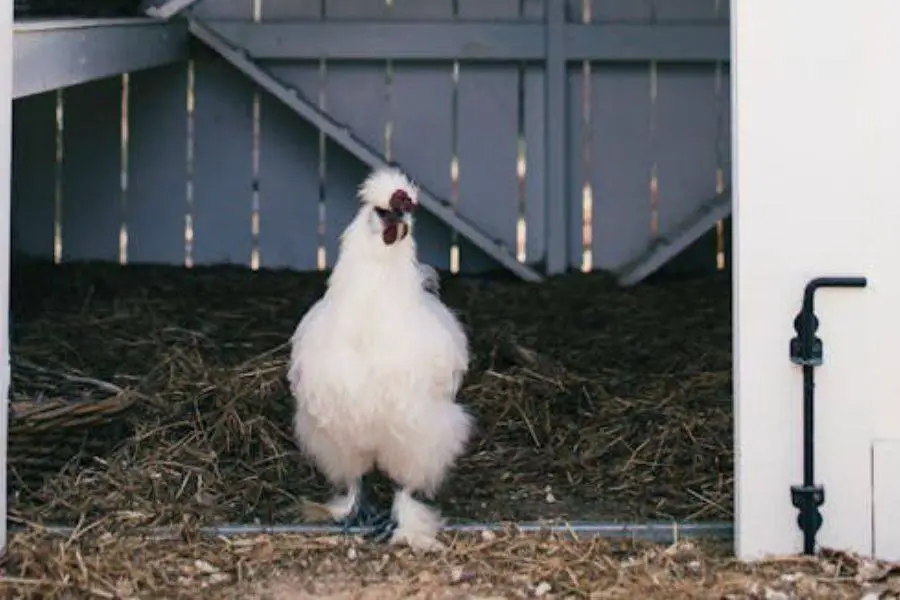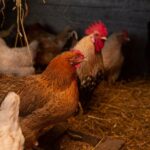Table of Contents
The temperament of a chicken can greatly influence its interaction with humans and other chickens.
While some breeds are known for their docility and friendliness, others have a reputation for being more aggressive or aloof.

It’s important to note that individual birds within a breed can vary in temperament due to factors like socialization, environment, and handling.
Factors Contributing to Unfriendliness in Chickens
Unfriendliness in chickens can be attributed to several factors. These include genetic predisposition, lack of socialization, stress, illness, or poor handling.
Unfriendly behaviors may include pecking, scratching, or avoiding human contact.
Breed 1: Rhode Island Red
Rhode Island Reds are often seen as unfriendly due to their assertive nature.
This breed’s personality is characterized by dominance and a strong pecking instinct, which can lead to aggressive behaviors.
They have a tendency to establish themselves at the top of the pecking order and can bully other, more docile breeds, particularly when resources like food or nesting boxes are limited.
This assertiveness can sometimes escalate into physical aggression, such as feather plucking or pecking at other chickens.
Additionally, Rhode Island Reds are known for their high energy levels, which can translate into restlessness if they’re confined to small spaces.
This restlessness can further exacerbate aggressive behaviors, contributing to their reputation as an unfriendly breed.
Breed 2: Leghorn
Leghorns are often perceived as unfriendly due to their independent and flighty nature.
This breed is characterized by high activity levels and a strong desire for exploration, which can make them resistant to handling and confinement.
Leghorns prefer to roam freely and may become stressed or agitated when forced into close contact with humans.
This agitation can manifest in behaviors like wing flapping or attempts to escape, which can be interpreted as unfriendliness.
Additionally, Leghorns are known for their alertness and cautiousness, which can make them wary of human interaction.
These traits, combined with their resistance to handling, contribute to their reputation as an unfriendly breed.
Breed 3: Polish Chickens
Polish chickens’ reputation for unfriendliness primarily stems from their impaired vision due to their signature feathered crests.
These feathers can grow over their eyes, limiting their visibility, which can make them prone to startling easily.
When startled, Polish chickens may exhibit skittish behaviors such as running away or flapping their wings.
Furthermore, their limited vision can make them feel threatened in situations that other chickens may not find intimidating, leading them to react defensively.
This defensiveness can manifest in behaviors like pecking or scratching, which can be perceived as unfriendliness.
Breed 4: Ancona
Ancona chickens are often seen as unfriendly due to their active and independent nature. This breed is characterized by high energy levels and a strong desire for freedom.
They prefer to have ample space to roam and explore and can become stressed if confined or handled excessively.
Signs of this stress can include pacing, pecking at enclosures, or vocalizing loudly, which can be interpreted as unfriendly behavior.
Additionally, if Anconas do not have sufficient space to expend their energy, they may resort to aggressive behaviors such as pecking or scratching, further contributing to their reputation as an unfriendly breed.
Breed 5: Hamburg
Hamburgs are often seen as unfriendly due to their active and independent nature. These birds are known for their energy and love of exploration, which can make them resistant to confinement and handling.
They prefer to spend their time foraging and exploring their surroundings rather than interacting with humans, which can come off as aloofness.
If forced into close contact with humans, they may become agitated and attempt to escape, which can be perceived as unfriendly behavior.
Their need for space and independence, combined with their resistance to handling, contributes to their reputation as an unfriendly breed.
Breed 6: Araucana

Araucanas are often considered unfriendly due to their aloof and independent nature. This breed has a strong pecking instinct and is not particularly sociable with humans.
They prefer to keep to themselves and may resist attempts at handling, which can come off as unfriendliness.
Additionally, if Araucanas feel threatened or stressed, they may resort to pecking or scratching, which can be perceived as aggressive behaviors.
Their preference for independence, combined with their resistance to handling and potential for aggression, contributes to their reputation as an unfriendly breed.
Breed 7: Old English Game Fowl
Old English Game Fowls are often seen as unfriendly due to their strong territorial instinct.
This breed is known for its assertiveness, especially among males, who may fight with other roosters to establish dominance.
This aggression can make them unsuitable for mixed flocks where more docile breeds are present.
Additionally, Old English Game Fowls may resist handling, which can be interpreted as unfriendly behavior.
Their territorial nature, potential for aggression, and resistance to handling all contribute to their reputation as an unfriendly breed.
Breed 8: Cornish Chickens
Reasons for Their Unfriendliness
Cornish chickens are often seen as unfriendly due to their independent and somewhat aloof nature.
This breed is known for its stoic demeanor and tends to keep to itself, often appearing uninterested in human interaction.
They are not particularly sociable birds and may resist attempts at handling, which can come off as unfriendliness.
Furthermore, Cornish chickens are more focused on foraging and exploring their surroundings rather than engaging with their human caretakers, which can contribute to their reputation for being aloof.
Additionally, if they feel threatened or stressed, they may exhibit behaviors like pecking or flapping their wings, which can be perceived as aggression or unfriendliness.
Top Friendly Chicken Breeds to Consider
If you’re looking for a more sociable and friendly chicken breed for your backyard or farm, here are some top contenders.
These breeds are known for their gentle temperament, sociability, and ease of handling, making them great choices for beginners and families with children.

- Silkies – Known for their fluffy appearance and sweet temperament, Silkies are often considered the friendliest chicken breed. They’re great with kids and are known to be good brooders.
- Orpingtons – Orpingtons are large, friendly birds known for their docile behavior. They’re hardy in various climates and are excellent layers.
- Australorps – Australorps are calm and friendly, and they’re also known for their exceptional egg-laying abilities.
- Plymouth Rocks (Barred Rocks) – These birds are friendly and easy to handle, making them a popular choice for families. They’re also good layers of brown eggs.
- Cochins – Known for their large size and feathered feet, Cochins are very docile and friendly. They’re more laid back than some other breeds, making them a good choice for a peaceful backyard flock.
- Sussex – Sussex chickens are friendly and curious, and they’re good layers as well. They come in several color varieties.
Remember, individual chickens within a breed can vary in temperament, so it’s always a good idea to spend time with your chickens to understand their individual personalities.
Conclusion
In summary, while many chicken breeds are friendly and sociable, some are known for their unfriendly dispositions.
Breeds like Rhode Island Reds, Leghorns, Polish Chickens, Anconas, Hamburgs, Araucanas, and Old English Game Fowls can sometimes exhibit behaviors that are perceived as unfriendly, such as aggression, aloofness, or a dislike of being handled.
It’s important to remember that individual temperaments can vary within a breed, and not all chickens of these breeds will necessarily exhibit unfriendly behavior.
Factors such as handling, socialization, and environment play a significant role in shaping a chicken’s behavior.
Understanding the typical temperament of a breed can help in selecting chickens that best suit your needs and lifestyle.








